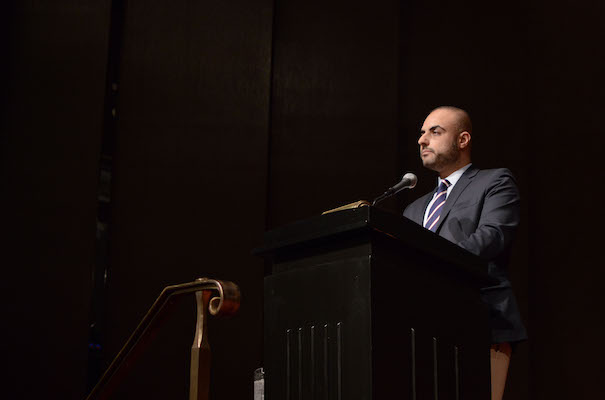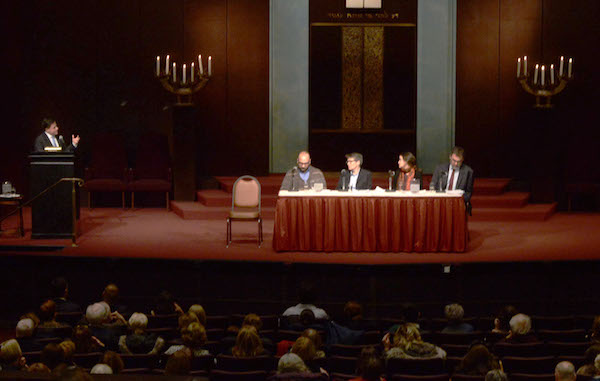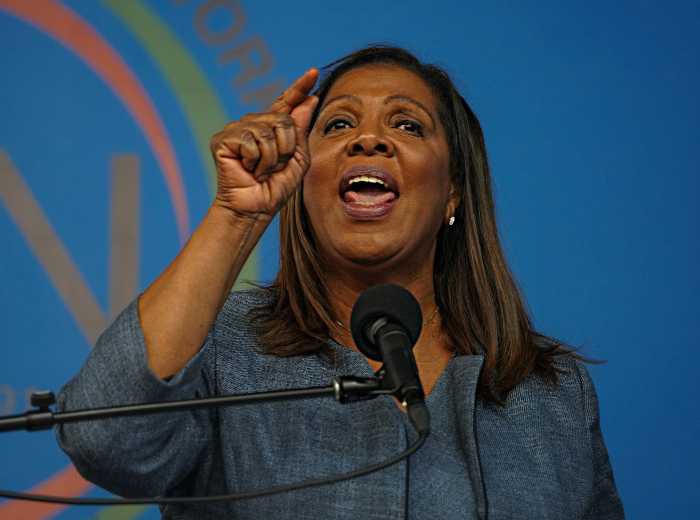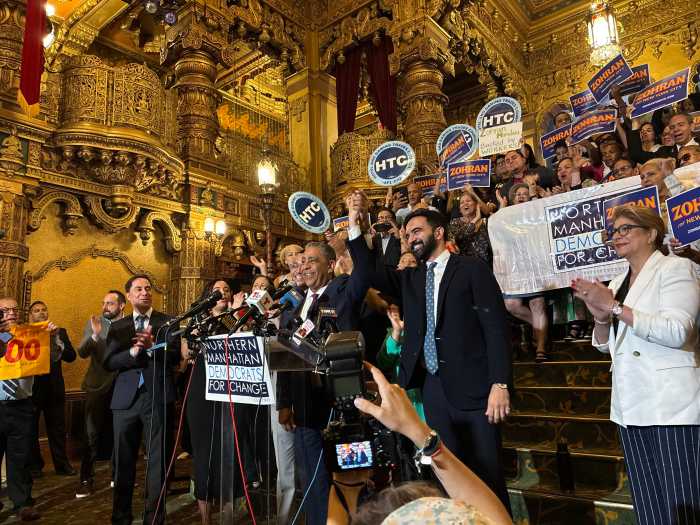
BY JACKSON CHEN | The Soviet Union in the 1970s was a hostile environment for its Jewish residents. Simply speaking Hebrew or observing the Sabbath could get you thrown in jail. And the glass ceiling was ever-present for those Jews who were able to find work. As a young Jewish girl, these were the circumstances Marianna Vaidman Stone would have faced.
“Everyday, in a zillion little ways, being Jewish in Russia was degrading and difficult,” Vaidman Stone said at a February 15 community meeting called by City Councilmember Dan Garodnick. “My parents found it intolerable but they couldn’t just leave.”
The meeting, held at Temple Emanu-El on East 66thStreet, was the second in a series of “call to action” forums the East Side councilmember has hosted in response to the election of Donald Trump.
Vaidman Stone recalled that only a limited number of emigrants were granted escape from the Soviet Union, and her family initially was not among the few given permission to leave the country. But on the other side of the world, the American Jewish community mobilized and advocated aggressively on behalf of Russian Jews. Eventually, the US government succeeded in applying enough pressure on the Soviet Union, which granted thousands of exit visas for its Jewish citizens.
In 1979, when Vaidman Stone was seven, she and her parents were able to escape the oppression of her native country. But their road to America was a convoluted one, as they were first processed in Vienna and next consigned to Italy before finally entering the US.
It wasn’t easy at first, she recalled, as her family dealt with accusations of being Communist spies or “moochers,” due to their receiving food stamps and free school lunches. But her family eventually carved out a new life in America, and Vaidman Stone went on to become a lawyer who now works as Garodnick’s chief of staff. A product of her refugee roots and the activism that gave her family a chance, Vaidman Stone is paying it forward by trying to help those who are currently in a similar situation.
“I’ve never forgotten it was the willingness of total strangers to go to rallies in the cold, to do walkathons, to call their elected officials, and to give money to local organizations,” Vaidman Stone said. “These acts allowed my family to come to America and build a new life.”
But the outlook for overseas refugees in the age of Trump is bleak.
Hasan Agili grew up in Libya, but realized in his teenage years that he would never belong or be accepted in his home country. He long harbored hopes of being able to pursue the American dream, to live in a country of immigrants whose residents come from all walks of life.
In Libya, he was just an exam away from graduating from medical school, Agili recalled, when he was outed as a gay man to the university by a former friend who had snooped around on his personal computer.
“I saw the doors closing on my dreams as I stood there powerless,” Agili said. “I heard news of friends beheaded, thrown from high buildings just for being gay.”
He continued, “One night I said, ‘That’s it, I must leave now, I must survive.’”
The refugee hopped from Jordan to Lebanon to escape his home country, all along with the intention of entering the fabled Land of the Free. But for several years he was lost in the system, with US agencies digging into his character, carrying out background checks with fingerprints and medical exams, and putting him through in-person interviews that could last the entire day, Agili said. On June 8, 2016, Agili became the sole Libyan refugee admitted into the US during all of last year.
Agili is fortunate that he was able to enter the country before Trump’s first week in office. On January 27, the president signed a sweeping executive order that barred general refugee entry for 120 days as well as suspending all immigration from seven Muslim-majority nations — Iran, Iraq, Libya, Somalia, Sudan, Syria, and Yemen — for 90 days and indefinitely banning refugees from Syria. Despite a federal appeals court’s hold on that order, Agili is uncertain of his future.
“I have been told after one year of my admission I should get my green card, and five years later I get my citizenship,” Agili said. “Now I have no idea what will happen next June.”

Despite the setbacks Trump suffered over his initial executive order, the president announced during a news conference on February 16 that he would be issuing another order on immigration next week. This past weekend, news spread on social media that Immigration and Customs Enforcement has been raiding immigrant communities in New York City and elsewhere.
As a sanctuary city, New York City and its elected officials have stood in opposition to Trump’s stance on immigrants. Many residents of the city share that view, as evidenced by repeated protests at locations from John F. Kennedy International Airport to Battery Park, the federal courthouses in Foley Square and downtown Brooklyn, and the Stonewall Inn in the West Village.
For his second community mobilization event, Garodnick invited experts from organizations working to defend those immigrants who are vulnerable.
Mark Hetfield, the president of HIAS, a refugee resettlement organization, said he believes Trump’s executive order to be a “declaration of war against refugees” as the order’s language demonizes a collective group.
HIAS, represented by the American Civil Liberties Union, has filed a lawsuit against Trump and his order, and the group has little hope that the Republican majority in Congress will provide any bulwark against dangerous immigration and refugee restrictions.
Speakers at the event agreed that Trump’s executive order was rushed and legally questionable. According to Victoria Neilson, the legal director of the Immigrant Justice Corps, there was little concrete justification for the executive order.
“There’s been a lot of hyperbolic rhetoric –– ‘safety, fear, jihadists.’ Nothing is linked to any facts,” she said of Trump’s actions. “The court found that the only defense the administration has for this order is to say, ‘I’m president, I can do what I want.’”
Neilson emphasized that so far the courts have sided with the rule of law, looking beyond Trump’s signature as the ultimate authority on immigrant matters.
Still, said Murad Awawdeh, the director of political engagement for the New York Immigration Coalition, organizations such as his are working in uncertain times with Trump’s presidency already proving to be a game-changer.
Many attendees questioned whether the ongoing protests against Trump’s immigration efforts are producing as much impact as they need to and what means they could utilize to achieve greater results.
Chloe Tribich, the associate director of development for Make the Road NY, said the protests have created a climate that enables judges to do the right thing and cracks apart the Republican consensus. She urged those who care about immigration issues to get involved with one of the many advocacy groups and also to continue calling their elected officials to make sure their opinions are heard.
Garodnick gave out the phone numbers for the elected officials on the city, state, and federal levels who represent the area, while stressing where he stands on the issues.
“There’s a deep commitment on behalf of New York City to continue to be a sanctuary city and a feeling that we will stand up to federal efforts that try to deny us that ability,” Garodnick said. “We’re proud of our designation. We think it makes New York City a safer place to be, and that’s not changing.”





























